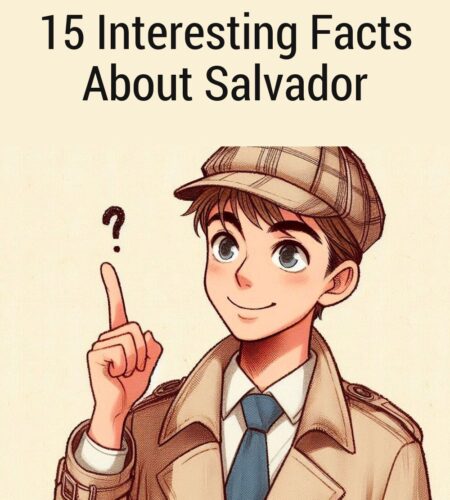Introduction:
Nestled on the coast of Brazil is one of the oldest cities in the New World, the beautiful coastal city of Salvador. A symbol of resilience and a testament to the strength of its people, the city of Salvador has a long and fascinating history. From the moment colonial Dutch and Spanish forces arrived in the region, to the modern day, Salvador has had a unique and unforgettable impact on Brazilian and Latin American culture. Here are 15 interesting facts about Salvador.
Fact 1: Salvador was the first capital of colonial Brazil
The Portuguese were the first colonizers in the area, arriving in 1501 and establishing their first capital there, before eventually shifting it to Rio de Janeiro in the late 18th century. Salvador, which was known by various names until it was definitively called Salvador da Bahia in 1698, was the original capital of colonial Brazil and served as the main port of entry for new arrivals. It is also believed that Salvador had the first cartel of slave traders in the Americas.
Fact 2: Salvador was a major slave port
During its colonial heyday, Salvador was a major port for African slaves coming into Brazil, which was the primary destination for the slave trade throughout most of the 16th century. During this period, an estimated 400,000 slaves were taken through the port of Salvador and transported across the Atlantic Ocean. It is said that during the height of the slave trade, Salvador had the largest population of Africans in the New World.
Fact 3: Salvador is home to the largest Carnival in the world
Salvador’s annual Carnival is the largest in the world, with millions of people from around the world descending on the city to take part in the festivities. The Carnival, which is held every year ahead of Lent, typically features samba parades, street parties, and a vibrant street culture that has greatly influenced Brazilian culture.
Fact 4: Salvador is an UNESCO World Heritage Site
In 1985, Salvador was designated a UNESCO World Heritage Site because of its unique Baroque architecture, which spans from the colonial period to more modern times. This unique architectural ensemble comprises of churches, mansions, and cobblestone streets that provide the backdrop to the city’s vibrant culture.
Fact 5: Salvador has some of the best seafood in the world
Salvador is known for its rich culinary scene, with some of the freshest seafood in the world. Popular dishes in the area include Moqueca de peixe (seafood stew), Bobó de camarão (shrimp stew) and Acarajé (black-eyed pea fritter).
Fact 6: Economic capital of the Northeast
Salvador is the economic capital of Brazil’s Northeast region and the country’s second-largest city, after São Paulo. It was the center of the sugar cane industry during colonial times and today is a major commercial and financial hub in the country.
Fact 7: Salvador is a music capital
Salvador is known as the music capital of Brazil and is home to a variety of musical styles, including samba, Afro-Brazilian music, and forró. In the 19th century, the city gave birth to the popular samba-reggae style, which is now a reference point in Brazilian music.
Fact 8: Salvador is home to the world’s largest church
The St. Francis of Assisi Cathedral, or “Terreiro de Jesus,” is the largest church in the world and the largest sacred site in the New World. This stunning cathedral was constructed in 1802 and is considered one of the seven wonders of Brazil.
Fact 9: Third-largest film industry in Latin America
Salvador became an important destination for film production after the 1960s, when the so-called Cinema Novo (or New Cinema) movement took off. The city now boasts the third-largest film industry in Latin America, producing some of the most respected and acclaimed films from the region.
Fact 10: Home to one of Brazil’s most important universities
Established in 1792, the Federal University of Bahia (UFBA) is the oldest university in the northeast region and one of the most important in the country. The university has a great legacy and is responsible for creating some of the most influential and innovative minds in Brazil.
Fact 11: An art-centric city
Salvador is a city that celebrates the arts. From street art to galleries, the city is known for its vibrant art scene. Most notably, the city plays host to the Salvador International Biennial, one of the biggest art events in the country, which showcases the work of hundreds of Brazilian and international artists.
Fact 12: Pronounced “Salv-a-doh”
Despite its Spanish-sounding name, Salvador is actually pronounced in the Portuguese style, with the emphasis on the second syllable.
Fact 13: Largest Afro-Brazilian population
Salvador is home to the largest population of Afro-Brazilians in the country, with estimates of up to 80 percent of its inhabitants of African descent. As a result, the city also boasts the largest African cultural heritage in Latin America, with a variety of Afro-Brazilian festivals, music, and traditional arts taking place regularly.
Fact 14: Impressive fortifications
One of Salvador’s main attractions is its stunning military fortifications, which include the Loreto Fort and the São Marcelo Fort. These imposing structures were used by the Portuguese to protect the city from Dutch and French invasions and are now popular tourist attractions, with incredible views of the city and its surroundings.
Fact 15: A foodie paradise
Salvador is a foodie paradise, with some of the most interesting and unique dishes in the country. Dishes such as acarajé, abará, and vatapá are all local delicacies that are popular with tourists and locals alike.
Conclusion
From its interesting history, to its impressive fortifications and vibrant culture, Salvador is an incredibly fascinating city. It is a destination for those seeking to experience an authentic Brazilian experience and to immerse themselves in one of the most unique cities in the Americas.
Subscribe to our email newsletter to get the latest posts delivered right to your email.



Comments